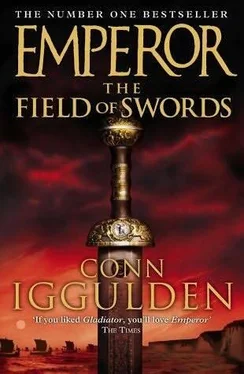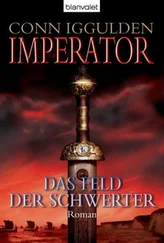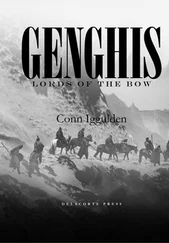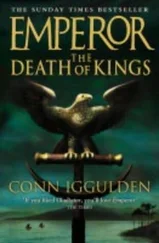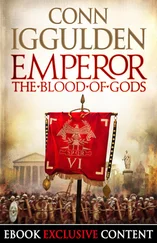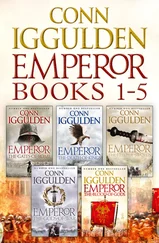There could be no more rebellions. Over the days to come, the word of the defeat would be taken to every tiny village and town across the vast country.
“Here he comes,” Mark Antony said, interrupting Julius’s thoughts.
They all stood as one, straining to see the king as he descended the steep path to where the legions waited. He was a lonely figure.
Vercingetorix had changed from the angry young warrior Julius remembered so long before. He rode a gray horse and wore full armor that gleamed in the first light. Julius was suddenly aware of his own grime and reached to detach his cloak, then let his hand fall. He owed the king no special honor.
Cingeto’s blond hair was bound and plaited in heavy cords to his shoulders. His beard was full and shone with oil, covering the gold links he wore at his throat. He rode easily, carrying an ornate shield and a great sword that rested on his thigh. The legions waited in silence for this man who had caused them so much grief and pain. Something about his stately descent kept them quiet, allowing him this last moment of dignity.
Julius walked to meet the king with Brutus and Mark Antony at his sides. As he strode to the foot of the road, the rest of his generals fell in behind and still no one spoke.
Vercingetorix looked down at the Roman and was staggered at the differences since their first meeting, almost a decade before. His youth had been left on the fields of Gaul, and only the cold, dark eyes looked the same. With a last glance up at the forts of Alesia, Vercingetorix dismounted and lifted his shield and sword in his arms. He dropped them at Julius’s feet and stood back, holding the Roman’s eyes for a long moment.
“You will spare the rest?” he asked.
“I gave you my word,” Julius replied.
Vercingetorix nodded, his last worry vanishing. Then he knelt in the mud and bowed his head.
“Bring chains,” Julius said, and the silence was shattered as the legions banged their swords and shields together in a cacophony that drowned out all other sound.
As winter came again, Julius took four of his legions across the Alps to base themselves around Ariminum. He brought five hundred chests of gold with him on carts, enough to pay the tithe to the Senate a hundred times over. His men marched with coins in their pouches, and good food and rest had restored much of their polish and strength. Gaul was quiet at last and new roads stretched across the fertile land from one coast to another. Though Vercingetorix had burnt a thousand Roman farms, the land was taken up by new families before the end of summer and still they came, lured by the promise of crops and peace.
A bare three thousand of the Tenth had survived the battles in Gaul, and Julius had awarded land and slaves to each man under his command. He had given them gold and roots and he knew they were his, as Marius had once explained to him. They did not fight for Rome or the Senate. They fought for their general.
He would not hear of a single one of them spending a night out in the open, and every house in Ariminum was suddenly home to two or three of the soldiers, packing the town with life and coins. Prices went up almost overnight, and by the end of the first month there, the last of the wine ran dry, right across the port city.
Brutus had come with the Third Gallica and set about drinking himself to oblivion as soon as he was free and alone in the city. Losing Renius had hit him hard, and Julius heard continual reports of his friend involved in a different brawl each night. Julius listened to the innkeepers who brought their complaints, and paid their bills without a murmur of protest. In the end, he sent Regulus to prevent Brutus killing someone in a drunken rage and then heard reports of the two of them roaring around the town together, causing even more damage than Brutus alone.
For the first time since Spain, Julius did not know what the next year would hold for him. A million men had died in Gaul to serve his ambition, and another million had been sold to Roman quarries and farms, from Africa to Greece. He had more gold than he had ever seen, and he had crossed the sea to beat the Britons. He had expected to feel joy in his triumph. He had equaled Alexander and found a new world beyond the maps. He had taken more land in a decade than Rome had managed in a century. When he was a boy, if he could have seen Vercingetorix kneel, he would have gloried in it, seeing only the achievement. But he would not have known how much he would miss the dead. He had dreamed of statues and his name being spoken in the Senate. Now that those things were real, he scorned them. Even victory was empty because it meant the struggle was at an end. There were too many regrets.
Julius had taken Crassus’s house in the center of the city, and at night he thought he could still smell the perfume Servilia wore. He did not send for her to come to him, though he was lonely. Somehow the thought that she would break him out of his depression was too much to bear. He cherished the dark days of winter as reflections of himself and embraced the black moods as old friends. He did not want to pick up the reins of his life and go on. In the privacy of Crassus’s home, he could waste the days in idleness, spending afternoons watching the dark skies and writing his books.
The reports he had written for the city of his birth had become something more for him. Each memory was somehow constrained as he wrote it down. The ink could not express the fear and pain and despair, and that was right. It eased his mind to write each part of the years in Gaul and then put it aside for Adàn to copy out.
Mark Antony joined him at the house at the end of the first week. He set to work removing dustsheets from the furniture and making sure Julius ate at least one good meal a day. Julius tolerated the attention with reasonably good grace. Ciro and Octavian came to the house a few days later and the Romans set to work making it as clean as a legion galley. They cleaned out the clutter of papers in the main rooms and brought a bustle to the house that Julius found harder and harder to dislike. Though he had enjoyed the isolation at first, he was used to having his officers around him and only raised his eyes in mock indignation when Domitius turned up to take a room and the following night Regulus brought Brutus in over his shoulder. Lamps were lit all around the house, and when Julius went down to the kitchens, he found three local women hard at work there making bread. Julius accepted their presence without a word.
The wine shipments from Gaul arrived by ship and were seized upon thirstily by the citizens. Mark Antony secured a private barrel and in a night where they managed to forget the barriers of rank, they drank themselves unconscious to finish it in one session, lying where they fell. In the morning, Julius laughed aloud for the first time in weeks as his friends staggered about and crashed, swearing, into the furniture.
With the passes closed, Gaul was as distant as the moon and ceased to trouble his dreams. Julius’s thoughts turned to Rome and he wrote letters to everyone he knew in the city. It was strange to think of those he had not seen for years. Servilia would be there and the new Senate house must have been completed. Rome would have a fresh face to cover her scars.
In the mornings, with his study door closed to the rest, Julius wrote to his daughter at length, trying to make a bridge to a woman he did not know. He had given permission for her to marry in his absence two years before, but he had heard nothing since. Whether she read them or not, it was balm to his conscience to do it and Brutus had urged him to try.
It was tempting to gather a few horses and go back to the city, but Julius was wary of the changes that could have occurred in his absence. Without consular immunity, he would be vulnerable to his enemies there. Even if the Senate had left him the rank of tribune, it would not save him from the charges of killing Ariovistus or exceeding his orders over the Rhine. Julius was owed more than one Triumph by the Senate, but he doubted Pompey would be pleased to see him lauded by the citizens. Marrying Julius’s daughter should have been a rein on his temper, but Julius knew him too well to trust his goodwill, or his ambition.
Читать дальше
Конец ознакомительного отрывка
Купить книгу
